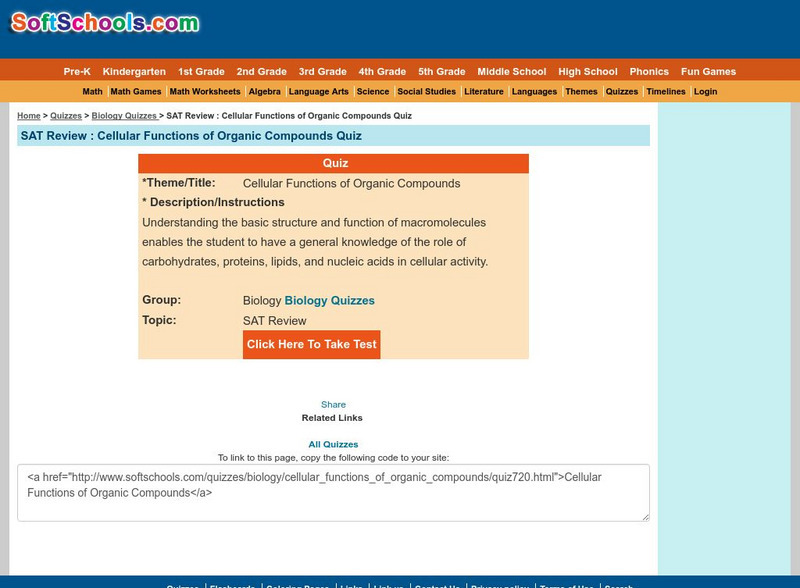Biology Corner
Biology Corner: Cell City Analogy
Students determine which cell organelles have a similar function to different places in a city.
BiologyWise
Biology Wise: Parts of a Cell
Describes the functions of a cell and the many parts involved in those functions.
BiologyWise
Biology Wise: Progenitor Cells vs. Stem Cells: Roles and Functions
Explains what progenitor and stem cells are and presents a chart showing their major differences, as well as a list of their scientific applications.
Cosmo Learning
Cosmo Learning: Introduction to Biology
A collection of video lectures from an introduction to biology course taught at the Massachusetts Institute of Technology. The course teaches "biological function at the molecular level" with thirty-five lectures. Lectures vary in length...
BiologyWise
Biology Wise: Centriole Functions
Describes the structure and functions of centrioles within a cell.
BiologyWise
Biology Wise: Facts About the Cell Nucleus
Discusses the discovery of the cell nucleus, its location, size, structure, composition, and functions.
BiologyWise
Biology Wise: Chromosomes: The Carriers of Genetic Information
Explains what chromosomes are, their structure, their functions within a cell, and the health impact of mutations in a gene sequence.
BiologyWise
Biology Wise: A Brief Comparison of Plant Cell vs. Animal Cell
Presents labeled illustrations of a plant cell and an animal cell which demonstrate the parts that are common and different. This is followed by a discussion of their similarities and then of their differences.
BiologyWise
Biology Wise: Mitochondria: Understanding Its Structure and Functions
The parts and functions of the mitochondria are described as well as the many illnesses that can result from mitochondrial dysfunction.
Ohio State University
Ohio State Univ.: Cell Expansion and Differentiation
This essay is complemented by useful illustrations of how plant cells enlarge after mitosis and become specialized for different functions. A good supplement to plant growth studies.
E-learning for Kids
E Learning for Kids: Science: Antarctica Research Center: What Do Cells Do?
For this lesson, students learn about the specialization of cells to perform different functions, and how they are organized into tissues and organs in the human body.
BiologyWise
Biology Wise: Rough Endoplasmic Reticulum and Cell Metabolism
The characteristics of the rough endoplasmic reticulum are described and its role in protein synthesis, including creating proteins, folding them, transporting them, and checking them for quality.
Texas Instruments
Texas Instruments: Cell Components
This StudyCards stack enables students to review the terms associated with the structures that comprise a living cell.
Soft Schools
Soft Schools: Cellular Functions of Organic Compounds Quiz
Take an interactive quiz over organic compounds. After completing the quiz, check your score, and then revisit any incorrect question for further review.
BiologyWise
Biology Wise: An Overview of the Difference Between Nadh and Nadph
NADH and NADPH are enzymes involved in cellular processes. Explains how NADH participates in catabolic reactions where energy is released and NADPH is involved in anabolic reactions where energy is consumed. Their functions and chemical...
BiologyWise
Biology Wise: The Smooth Endoplasmic Reticulum and Its Functions
The endoplasmic reticulum is found in eukaryotic cells. The characteristics and functions of the smooth endoplasmic reticulum are described and it is then compared with the rough endoplasmic reticulum.
ClassFlow
Class Flow: Plant and Animal Cells
[Free Registration/Login Required] This flipchart is intended to introduce plant and animal cells to fifth graders. Pictures, a web link, and several opportunities for student participation are included. An end-of-lesson assessment is...
BiologyWise
Biology Wise: Lysosome Structure
Lysosomes are found in both plant and animal cells. The structure and functions of this cell organelle are described here, with note made of the diseases that can be caused by defective lysosomes.
BiologyWise
Biology Wise: What Is the Nucleolus?
The characteristics, structure, and functions of the nucleolus are described.
BiologyWise
Biology Wise: Endoplasmic Reticulum Analogy
The endoplasmic reticulum is compared to a manufacturing plant with an assembly line to help students understand the functions of this important cell organelle.
Georgia State University
Georgia State University: Hyper Physics: Energy Cycle From Plants to Animals
Find out about the essential role energy plays in cell function and in sustaining life. Trace energy transformations as they pass from one living thing to another.
Khan Academy
Khan Academy: Cell Cell Junctions
Learn about the different types of intercellular junctions, including plasmodesmata, tight junctions, gap junctions, and desmosomes.
Khan Academy
Khan Academy: Signal Relay Pathways
Learn how signals are relayed inside a cell starting from the cell membrane receptor. Look at the general characteristics of intracellular signal transduction pathways, as well as some relay mechanisms commonly used in these pathways.
Khan Academy
Khan Academy: Response to a Signal
Article takes a look at examples of the different ways cells can change their behavior in response to a signal at both the "micro" and "macro" levels.










